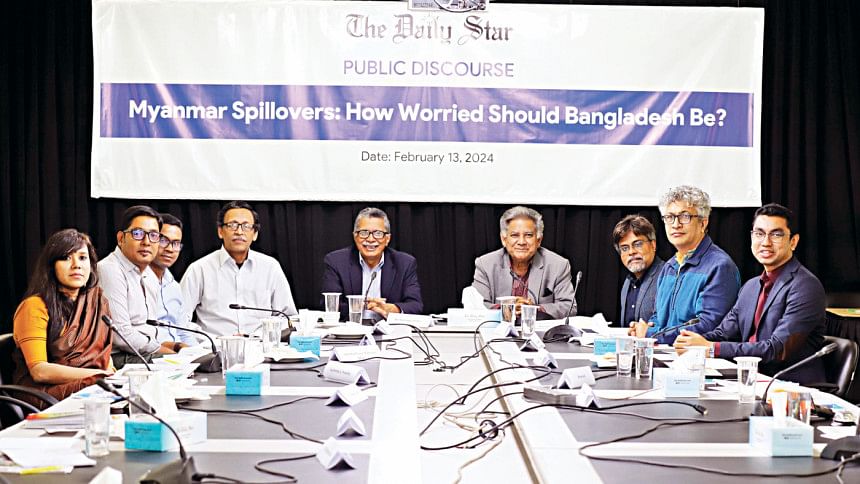Conflict in Myanmar: Bangladesh needs to handle the situation smartly

Dhaka should not fall into the trap of global and regional players over the Myanmar conflict, which has caused casualties inside Bangladesh, said foreign policy and security analysts.
The government needs to have a multi-layered diplomacy in place, which includes engaging the Arakan Army and Chin National Front that are dominating in Chin and Rakhine states bordering Bangladesh, alongside engagement with the Myanmar military, they said.
It should form an advisory group for consultation on the Myanmar issue for formulating strategies, they said at a discussion titled "Myanmar Spillover: How worried should Bangladesh be?" organised by The Daily Star at The Daily Star Centre yesterday.
The fighting between the Myanmar military and Arakan Army has forced some 330 Myanmar security forces and their family members into Bangladesh, while stray mortar shells and bullets landing in Bangladesh have created panic among locals.
Thousands of Myanmar nationals, including the Rohingya, were displaced, and there is a risk of new influx. Against this backdrop, the Border Guard Bangladesh has strengthened its capabilities along the border.
Bangladesh has sheltered over a million Rohingyas. No repatriation has taken place. The situation would be complicated due to the ongoing conflict in Myanmar, they said.
Security analyst Sakhawat Hussain said Bangladesh made mistakes in past by engaging with Myanmar bilaterally on the Rohingya repatriation.
"We can see clear possibilities of Arakan Army taking full control of Rakhine state by the year end, and the Myanmar military is now in a bad state."
"At this stage of time, we should go for diplomacy at track-2, track-3, and track-4 levels. We should engage the National Unity Government and the Arakan Army as well," said Brig Gen (retd) Sakhawat Hussain, also senior fellow at the South Asian Institute of Policy and Governance at North South University.
"We also should have the show of force as backup for diplomatic offensive," he said.
Bangladesh Enterprise Institute President M Humayun Kabir said the Myanmar crisis has created a more strategic problem than that of the Rohingya repatriation, and it is urgent to take effective measures to prevent it.
"There are risks of free movement to and from Myanmar. China can be involved in stabilising the conflicts in Rakhine. In that case, we can prevent further influx," said the former ambassador.
He suggested that ASEAN already has a five-point demand for Myanmar to transition into democracy, and Bangladesh can pursue for including the issue of Rohingya repatriation there.
Prof Tanzimuddin Khan of International Relations at Dhaka University said several crises could be created by the Myanmar conflicts -- there may be a fresh influx of Myanmar nationals, entry of the Myanmar's beleaguering forces, spread of arms and the insecurity of Bangladeshis along the border area.
He said the fact that the Arakan Army and other groups of Brotherhood Alliance are taking control of Rakhine and Chin states and they would require international recognition, Bangladesh should start "multi-layered diplomacy" by engaging various stakeholders in Myanmar.
Two major regional players will do everything to protect their national interests in Myanmar, and Bangladesh being the most affected country needs to smartly handle the situation, said Prof Tanzimuddin.
The government must keep in mind the national interest and strategic autonomy and smart handling of the Myanmar issue so that it is not in the trap of regional players, he said.
The foreign ministry should have an advisory group consisting of foreign policy and security experts for consultation, Prof Tanzimuddin said.
Southeast Asian history researcher Altaf Parvez said Bangladesh's focus is Rakhine state, but Chin state is also very important for geopolitical reasons. The Chin state borders Bangladesh and there are commonalities between the Chin and some ethnic groups of Bangladesh.
Bangladesh needs to engage the Chin National Front (CNF), which has already formed its government and a constitution, as CNF is positive about Rohingya repatriation and their recognition, he said.
Altaf said Bangladesh may seek support of the CNF leaders for engaging the National Unity Government that is fighting the junta and committed to recognising and repatriating Rohingyas under federal democracy in Myanmar.
The Daily Star Deputy Editor Arun Devnath also spoke at the event moderated by Tanjim Ferdous, In-Charge of NGOs and Foreign Missions of the newspaper.

 For all latest news, follow The Daily Star's Google News channel.
For all latest news, follow The Daily Star's Google News channel. 



Comments